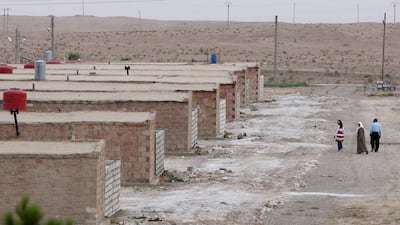Swedish female ISIS recruits could now be tried in Syria for terrorism offences after Kurdish authorities told Sweden’s Foreign Ministry that they wish to prosecute ISIS members in prison camps locally.
Sweden has been calling on the European Union to introduce an international tribunal to prosecute ISIS fighters, instead of sending them back to individual nations.
On Monday, Sweden's Foreign Ministry told The National that a delegation had a meeting last week with the Autonomous Administration of North and East Syria (Aanes), which is responsible for the Syrian camps, to discuss the issue.
"The local administration that is responsible for the camps has the ambition of prosecuting women for crimes, including collaboration with the terrorist organisation ISIS," a spokeswoman told The National.
“A delegation from the Ministry for Foreign Affairs made a consular visit to the Al Hol and Roj camps in north-east Syria. The visit focused particularly on the situation of children.
“The delegation met representatives of Aanes, as well as women and children with links to Sweden and representatives of humanitarian organisations.
“Information about orphaned children was followed up on site. The aim was also to gain better knowledge about the humanitarian situation in the camps and to discuss the conditions for bringing more children to Sweden. The Aanes initiative for local legal proceedings against adult camp inhabitants also came up in the discussion.”
The talks with the Kurdish authorities surprised some.
The director of the Counter Extremism Project think-tank, Hans-Jakob Schindler, said this would be a change in tactics for the Kurdish forces, who have previously been against prosecuting fighters locally.
"It is very interesting to see that the Kurdish forces are now apparently arguing for some version of the international tribunal idea," he told The National.
“So far, Kurdish forces were not keen to accept this argument. Furthermore, there is of course the general legal question about the status of the Kurdish territories in Syria, which are not yet an internationally recognised country and therefore, it is not clear under which law these individuals would be prosecuted.
“This is somewhat of a shift in position as far as I can see. Normally, in the past they were happy for anyone to be taken off their hands.
“The preference for prosecution locally, is something that many governments have been arguing in the past. For many governments the preference was that ISIS fighters and sympathisers should be prosecuted locally first, since it was very likely they had committed serious crimes in Iraq and Syria and evidence and witnesses would be in these areas.
"In their home countries, evidence would centre on their membership of a terrorist organisation and travel to the conflict zone, if that was made illegal before their departure, and any other crimes committed in the conflict zone could be prosecuted only with extreme difficulty since the evidence and the witnesses are in the conflict zone."
Despite calls for a tribunal, there have been stumbling blocks over where it would be located and if the laws would be internationally recognised.
Presently, Sweden is focused on returning orphans of ISIS recruits.
Last year Sweden repatriated seven youngsters from the Al Hol camp.
"In civilised countries, even the most heinous criminals get a fair trial. If what we have done is criminal, we will be held accountable in court," one Swedish prisoner in the Al Hol camp told Sveriges Radio.
“But our children are small. They have not committed any crime. They have not contributed in any way to what happened. We are Swedish. Take us home. If not for our sake, then for our children's.”
The National revealed last week that Swedish authorities had been to the camp to help interview the daughter-in-law of one of ISIS's most wanted women, Fatiha Mejjati, who is known as the Black Widow because of the strict terrorism training camps she ran.
Her 25-year-old daughter-in-law, who has not been named, was captured last year by the Kurdish-led SDF after the battle for the last ISIS stronghold in Baghuz, north-east Syria, and is presently in the camp with her three children.
Swedish officers are helping to interrogate her in an attempt to locate Mejjati, a source told Swedish newspaper Expressen.
The overcrowded camp houses about 70,000 people, many of them women accused of ISIS membership, and their children.


